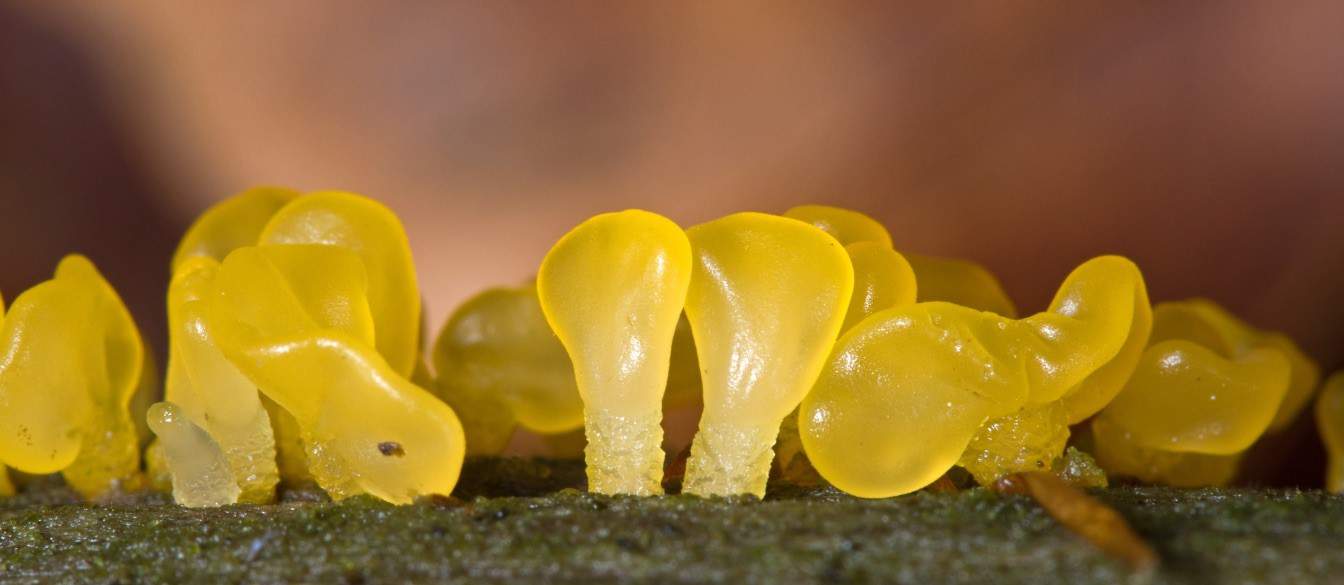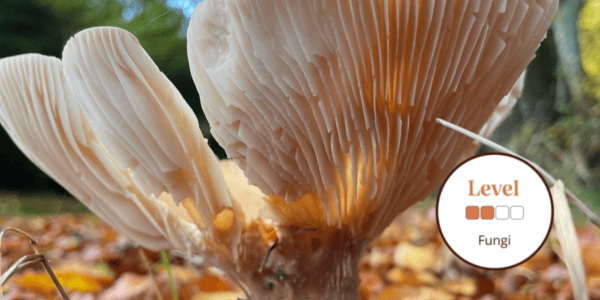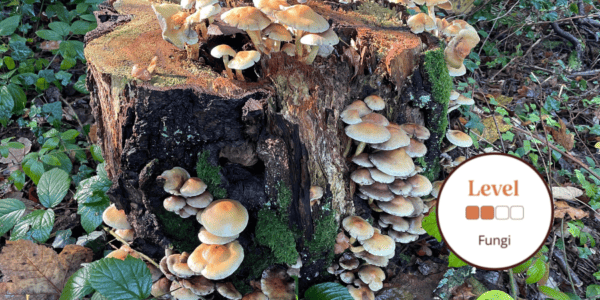This course on identification of macrofungi is for those who are interested in fungi, have some basic experience of trying to identify them (e.g. using a pictorial field guide or participating in group recording forays) and would like to take their identification skills further.
This fungi course will equip you with the skills necessary to set out on your fungi identification journey with confidence, be able to classify fungi into the correct major groups, and be able to identify many of the more commonly occurring fungi to at least genus level. You will explore field techniques, fungi structure and function, their ecology and distribution, as well as gain an understanding of the importance of these species for conservation and recording.
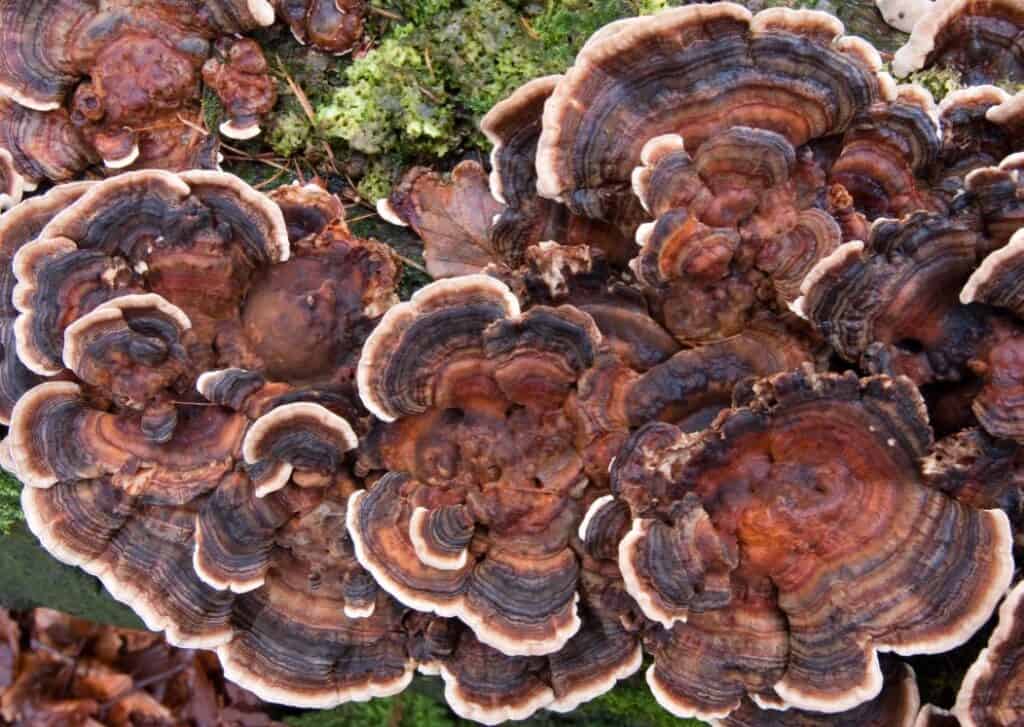
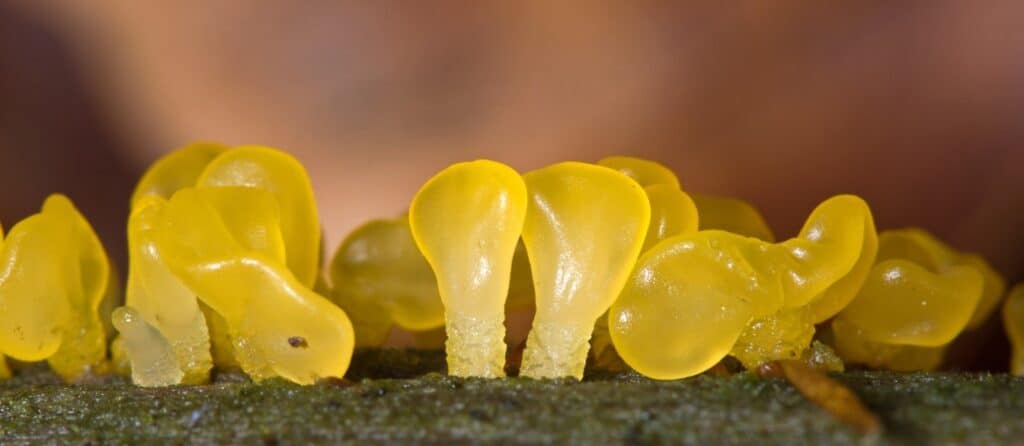
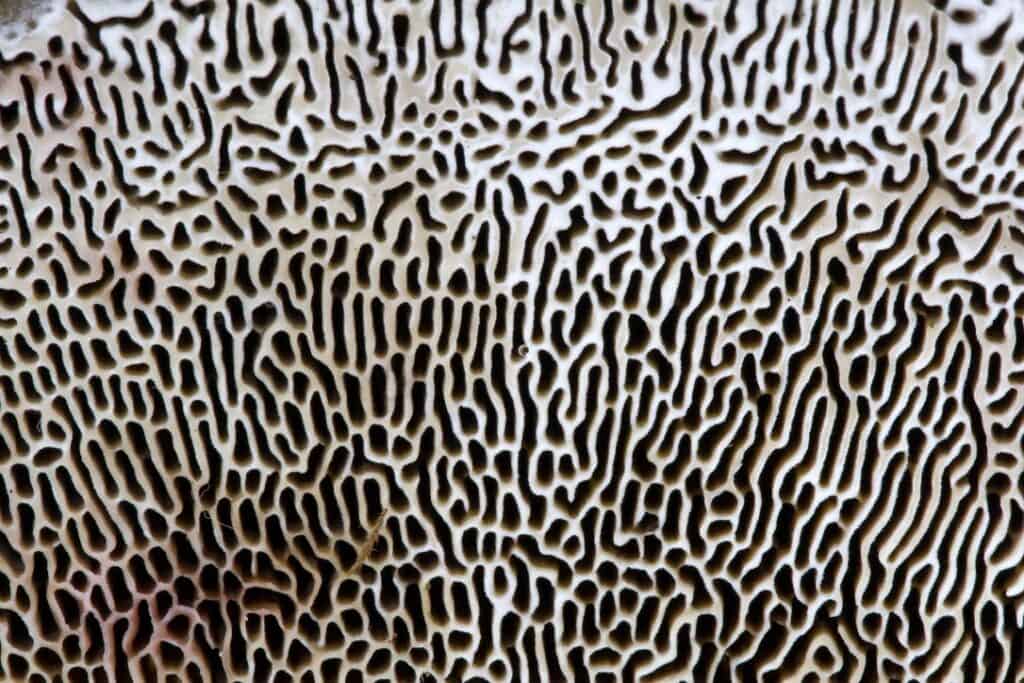
Read More
What will be covered during this course?
- Identification: during this course you will be taking part in excursions and allowed time to practice observing in the field.
- Collection and Recording: you will take part in the collection and recording of fungi in the field.
- Laboratory Sessions: there will be opportunities to take part in laboratory sessions including use of keys and microscopy with support from our expert tutor
- The course will be delivered through a combination of seminars, laboratory identification sessions and practical field work.
- Field work will involve visiting a range of habitats where the specimens can be identified within an ecological context.
- Defining fungi – how their life cycle differs from other groups and how they fit in with other groups of organisms
- Classification of fungi
- Study of fungi structure and function
- Identification, description, ecology, and distribution, with particular reference to the mushrooms and toadstools
- Focus on the more easily identifiable groups i.e. larger Basidiomyctes
- Field techniques for the identification of macro features
- The role of fungi as saprophytes and parasites; fungal ecology
- Fungal distribution with reference to climate, edaphic factors, and host species
By the end of the course, you will be able to:
- Define the diagnostic features of a range of macrofungi
- Identify species using appropriate tools
- Describe the general morphology and life cycles of macrofungi
- Compare the ecology and distribution of selected macrofungi and critically evaluate the roles they have as ecological indicators
Who Should Attend? – Natural history enthusiasts, students, rangers, ecologists, and environmental professionals. This intermediate level course is open to anyone with some knowledge of the subject. This course is for those aged 18 and over only.
Knowledge Level – Intermediate. Level descriptors can be found on the following web-page: Framework and Course Level Descriptors
You will have the opportunity to get out into the field and visit the rich range of habitats surrounding the Preston Montford Centre where your course will take place, identifying specimens within an ecological context to consolidate your understanding.
There are two booking options which all include course tuition, meals and refreshments:
- Non-Resident (Breakfast not included)
- Resident (Sole Occupancy)
For course bookings including accommodation please note bathroom facilities may be shared.
MMU Student Information
MMU students – please email [email protected] to book your course place.
Accreditation
This is one of a series of courses (units) run jointly with Manchester Metropolitan University (MMU) contributing to the MSc Biological Recording and Ecological Monitoring and the Postgraduate Certificate in Biological Recording. MMU students complete assessed work after the course. For further details about Manchester Metropolitan University degree programmes please contact:
Department of Natural Sciences, Manchester Metropolitan University, (Shrewsbury Office). Email: [email protected]
See the ‘Example Timetable’ and ‘What’s Included’ sections below for more information about this course.
Upon booking you will need to provide individual details of all attendees.
Please email [email protected] if you have any questions.
Assessment
For Manchester Metropolitan University students, the Unit will be assessed through, for example, identification tests, survey reports, field journals, production of keys, essays or other forms of assessment. In course tests are optional and less formal for participants who are not MMU students.
MMU students will be required to complete a portfolio comprising of two parts:
Part 1: Complete an identification assessment with the aid of any field guides/keys or notes. Justify your identification of each specimen using the most important diagnostic features. (Equivalent to 500 words)
Part 2: Collect a number of macrofungi specimens identified and fully labelled. Prepare voucher sheets for each species with appropriate information and layout, detailing key diagnostic features. The assessment will involve comparing and contrasting the features of different species. (1500 words)
Example Timetable
This timetable is subject to change but should give an outline of what to expect.
If you have booked accommodation with the Centre your bedroom will be ready from 3.00 pm onward on the day of arrival and we ask that you vacate by 9.30 am on the morning of departure.
If numbers are sufficient a station pick up will be arranged at 5.30 pm from Shrewsbury Station.
Please arrive in time for the evening meal at 6.30 pm
The course starts after dinner with a classroom session 7.30 pm - 9.00 pm
The course ends at 4.00 pm on the final day.
Time will be made available for eating packed lunches during the day.
Friday:
Time to settle in; lab introduction and introductions to course peers
Saturday:
Morning
9:15 Lab: How to collect fungi and take field-notes
9:45 Field Trip - take packed lunch
Afternoon
14:00 Lab: Describing and recording field collections; making spore prints; identifying, sorting out the genera, using keys and macroscopic characters
16:00 Tea/Coffee
16:15 Lab: Using microscopes. Preparing material for microscopy, observing spores
Evening
18:30 Evening meal
19:30 Lab: Talk on fungal diversity
20:15 Lab: Continue Identification (optional)
Sunday:
Morning
9:15 Field Trip - take packed lunch
Afternoon
13:30 Lab: Identification, microscope work
16:00 Tea/Coffee
16:15 Lab: Continue identification
Evening
18:30 Evening meal
19:30 Lab: Each member of the group to describe how they have identified one of the fungal species they collected on either of the field trips
Monday:
For credit students there will be a short test. Otherwise, you will continue lab work, practice microscopy and/or foray around Preston Montford. Rounding off the course will be a short talk on fungal recording. Course finishes at around 4 pm.
What's Included
What’s included?
- Classroom learning covering the theory of the subject
- Field excursions to apply new knowledge
- Expert tuition for which the Field Studies Council is renowned
- Clear objectives and progression
- All meals provided
You can rest assured that the absolute best content from an expert in environmental education will be provided. In choosing a Field Studies Council course, you will be joining thousands of people who learn with us each year.
Bursaries and Subsidies
Natural History Bursaries
There are a number of natural history bursaries available to help with the cost of your course. To find out if you and your chosen course are eligible, read more here.
Before You Attend
There will be a member of staff with first aid training and access to a first aid kit on site. If you have special medical or access requirements, please let us know as soon as possible so we can make any necessary adjustments.
What to bring
- Simple collecting equipment such as a small pocket knife, paper bags and pots (empty film containers, margarine tubs etc.), basket, compartmented box.
- Camera/phone for photography.
- Ruler and looseleaf A4 pad, field notebook.
- Hand lens x10.
- Packed lunch containers e.g. vacuum flask, sandwich box, water bottle.
- Warm clothing, waterproofs and stout footwear for the forays.
- A laptop or other electronic device for accessing online keys (if you have one)
- Your own microscope (if you have one)
Recommended field guides and reading
Please bring your own field guides with you if you have them.
- Collins Complete British Mushrooms and Toadstools: The essential photograph guide to Britain's fungi (Collins Complete Guides) by Paul Sterry and Barry Hughes.
- "An Initial Guide to the Identification of Mushrooms & Toadstools", book by Paul Nichol
- Online reference (e-)book, David Moore’s "21st Century Guidebook to Fungi"
Older but useful field guides:
- Buczacki, S. (1992) Mushrooms and Toadstools of Britain and Europe. Collins
- Grunert, H. (1991) Field Guide to Mushrooms of Britain and Europe. Crowood Press
- Marcel, B. (1987) The Mushrooms and Toadstools of Britain and Northern Europe. Hodder and Stoughton
- Phillips, R. (1981) Mushrooms and other Fungi of Britain and Europe. Pan
General interest background reading:
- Merlin Sheldrake’s "Entangled Life”
Peter Marren’s "Mushrooms: The natural and human world of British fungi" (British Wildlife Collection)
Paul Stamets’ “Mycelium Running”
Opportunities to attend this course
-
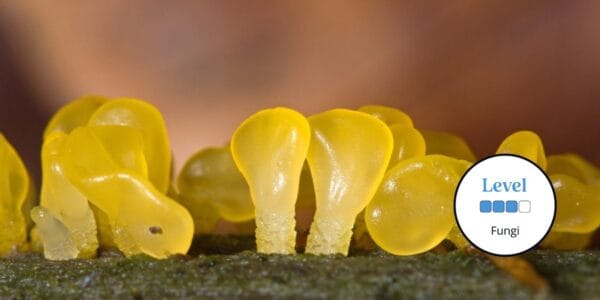
Fri 18, October 2024 18:30 - Mon 21, October 2024 16:00
MMU students - please email [email protected] to book your course place.
Progress Your Learning
This is a training course from the Field Studies Council, delivered by expert tutors with an approachable learning style. After attending this course, you may like to progress your learning with further relevant courses or branch out into other areas of natural history. The Field Studies Council offers both online and in person courses, so you can choose the learning style that suits you best.
The course gives you the opportunity to immerse yourself in a new subject and acquire novel skills. Our online portal gives you time to study at your own pace and fit the lessons around your own schedule.
If you have any questions about our online courses please check our Frequently Asked Questions
Please email [email protected] if you have any questions.
Group Bookings Made Easy
If you have a group of 10 or more individuals wanting to complete one of our courses, our team are available to discuss your options – from discounts to private team courses. Find out more!
You can rest assured that the absolute best content from an expert in environmental education will be at your fingertips. In choosing a Field Studies Council course, you will be joining thousands of people who learn with us each year.

